Blog
March 27, 2025
The 2025 PHP Landscape Report has officially arrived, and it is full of insights and analysis on the current trends, technologies, and challenges impacting PHP usage. With PHP now in its 30th year, this edition represents a particularly exciting opportunity to explore how the ecosystem has evolved and adapted to meet current needs.
This blog is the first in a series exploring key PHP usage statistics and trends from our new report. Here, we'll break down who provided the presented data, and then give an overview of PHP usage this year, including key findings around what kinds of applications teams are building, the technologies these apps are integrating with, and deployment strategies teams are implementing.
About the 2025 PHP Landscape Report
Each year, we conduct an anonymous survey of self-identified PHP developers and administrators, seeking to track the current and future state of PHP usage throughout the ecosystem. To accomplish this, we ask questions surrounding a variety of topics, including observability trends, container and orchestration usage, security and compliance strategies, and much more. We then compile our findings into our annual PHP Landscape Report to track ongoing PHP trends.
Back to topRead the Full 2025 PHP Landscape Report
Unlock our full findings on PHP usage, deployment trends, security patterns, and more in the 2025 landscape. The report is completely free, so make sure to grab your copy today.
About the Surveyed Participants
Our 2025 survey received 561 responses from PHP professionals around the world and across industries, with the most commonly represented sectors being Software as a Service and Technology. When looking at job titles of survey participants, Developers were the most represented at 74.34% of participants, followed by Manager/Directors (9.27%) and C-Suite (4.99%).
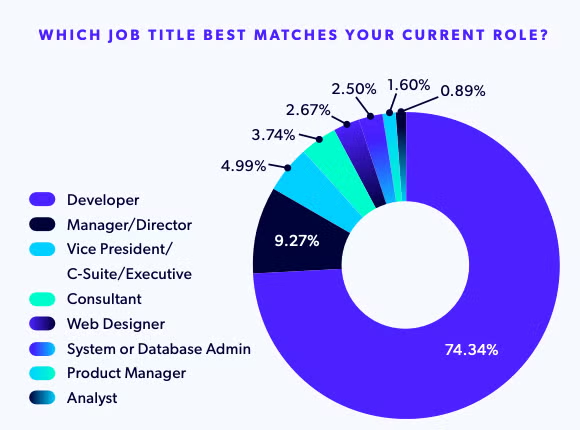
Tracking with previous years, we also found that our participants tended to be on smaller development teams, with approximately 75% containing nine members or fewer. Respondents also were more likely to work at smaller companies, with over 50% at organizations with 100 employees or fewer.
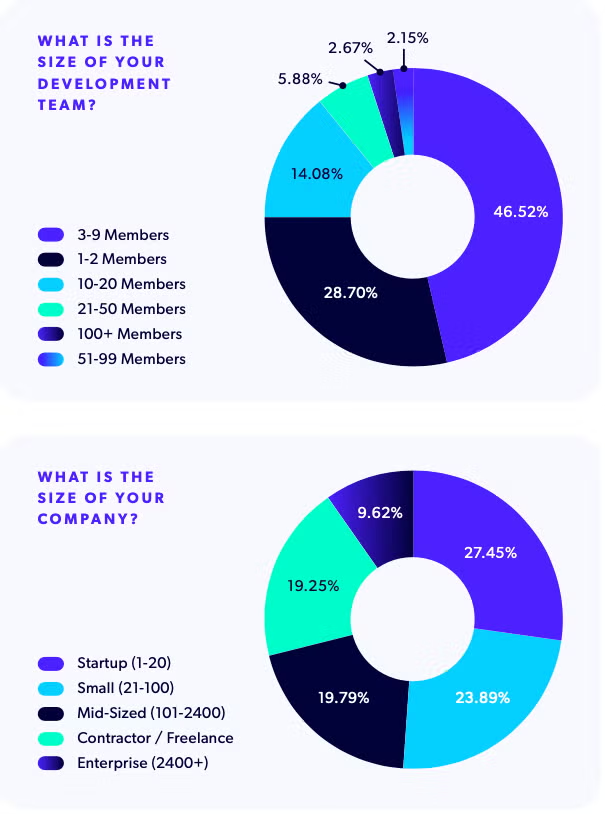
Examining the firmographic profile of our participants, we feel it is logical that most of our survey respondents were developers, as this title usually has the most involved role in managing and building PHP applications. Additionally, we found that the reported developer team and company sizes tracked with previous iterations of our report. Given our sample size and these factors, we feel that our findings are representative of greater PHP trends in the landscape.
For further information regarding the firmographic details of our participants – including a full list of industries represented, annual budget for IT infrastructure, geographic location, and years of PHP experience – be sure to download the full report.
Back to topPHP Usage in 2025: Top Application Types
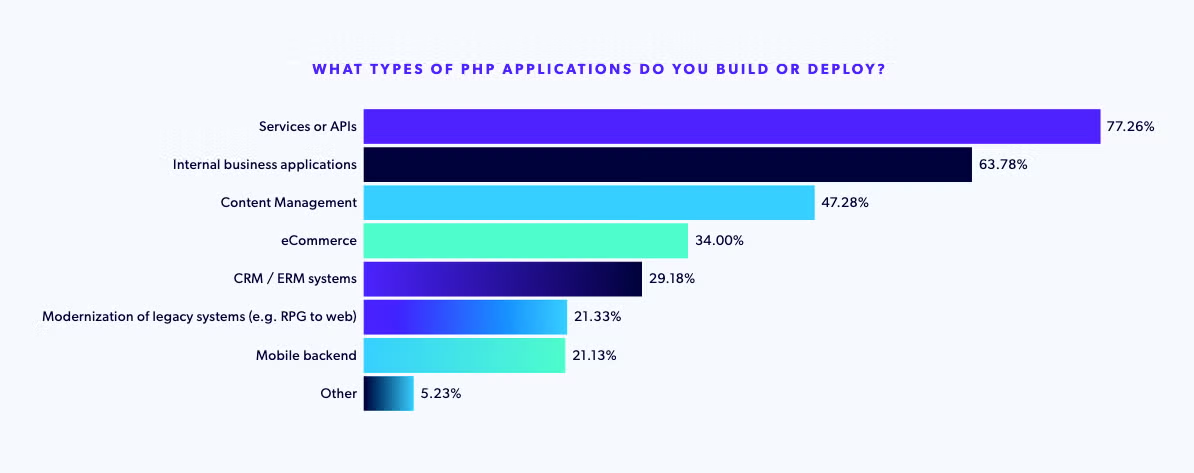
Each year, we ask our participants to share what types of PHP applications they are building or deploying, with the option to select multiple choices. This helps us track changing trends in PHP usage. As we've seen in previous years, Services or APIs was the top selected option at 77.26% of responses. This was followed by Internal Business Applications (63.78%), Content Management (47.28%), and eCommerce (34.00%).
PHP Trends Surrounding Application Integration
After exploring what our respondents were using PHP to build, we asked them to report which systems their PHP applications integrate with, allowing for the selection of multiple options as applicable. Over 90% stated that they integrated with Relational Databases (such as Maria DB), followed by 85.11% with Web APIs, 71.23% with Filesystems, and 57.95% with Key-Value Storage (such as Redis or Memcached).
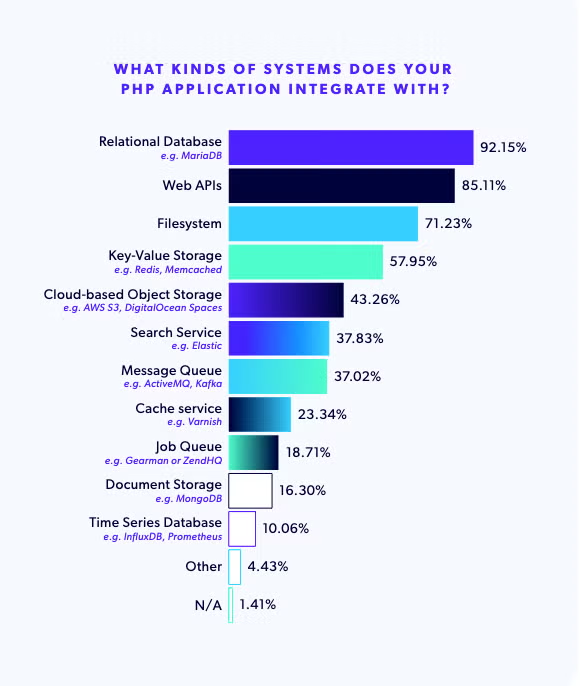
Key Takeaways
PHP has long been known as the "glue language for the web." Its rich ecosystem of extensions provides connectivity to just about any database technology, and the expansive set of tooling for performing web requests means that it can pull and push data anywhere.
These capabilities are mirrored in what PHP powers, and the fact that APIs are so prevalent is no accident. Because browsers are ubiquitous and provide a consistent experience across operating systems, many businesses choose to build internal applications as web applications. Their way is considerably eased by the fact that PHP can connect with just about anything, allowing these applications to provide business-critical integrations. It's no wonder that PHP usage continues to maintain popularity among developers.
Back to topPHP Trends Around Application Deployment
We next asked our survey participants to share where they deploy their PHP applications, allowing them to select multiple answers as applicable. 55.67% of applications were deployed on-premises, 33.62% on Amazon Web Services, 29.98% on Other, and 12.42% on Digital Ocean. Most write-in responses were specific to web hosting providers, with Hostinger and Hetzner as the top write-in options.
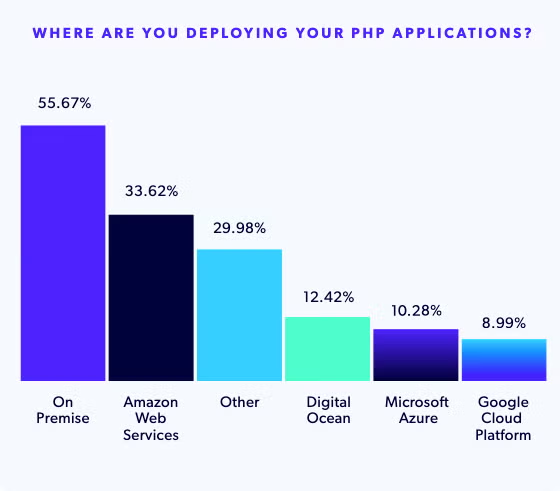
We then segmented our findings by company size to get a clearer picture of PHP usage and deployment trends. We found that smaller companies with 100 employees or less were more likely to adopt Digital Ocean compared to their larger counterparts (10.22% vs. 3.40%). Larger companies with over 100 employees, however, were more likely to deploy on Amazon Web Services than smaller companies, at 27.67% vs. 20.04%.

Key Takeaways
The results this year continue trends we observed in 2024, with an increasing number of organizations bringing their web applications on-premises, repatriating them from public clouds. This pairs with other observations we've made that could be contributing factors, such as rising prices across all clouds, as well as data privacy and regulatory compliance. Fortunately, one of PHP's strongest suits has always been ease of deployment. This makes these migrations relatively easy for businesses to accomplish.
Back to topFinal Thoughts
The 2025 PHP Landscape Report underscores the continued relevancy of PHP in web development. While many PHP usage and deployment trends remain consistent year over year, they also reflect the strategic choices made by PHP teams around the world as they respond to financial, operational, and other needs.
In future blogs exploring our 2025 PHP Landscape Report, we'll cover a variety of PHP trends, including adoption and migration plans, security and compliance strategies, how teams are tackling application monitoring, and more. If you're eager to check out the data sooner, click the button below to grab a PDF of our full findings.
Stay Ahead of PHP Trends in 2025
Want to learn more about ongoing trends, PHP usage, and upcoming challenges in the PHP ecosystem? Download your free copy of the 2025 PHP Landscape Report or contact a Zend PHP expert today.
Additional Resources
- Blog - PHP Maintenance and Tech Debt: 2025 Trends
- Blog - Ubuntu 20.04 PHP Support After EOL: Are You Ready?
- Blog - How to Advance Your Career in PHP
- Blog - GDPR PHP Compliance: Maintaining GDPR for Web Applications
- Blog - Fintech PHP Applications: How PHP Supports the Finance Sector
- Blog - What's New in PHP 8.4
- Blog - PHP 8.1 Upgrade Plans: How to Stay Ahead of EOL
